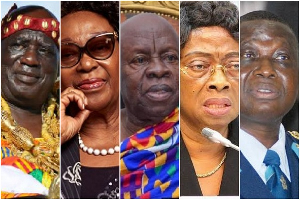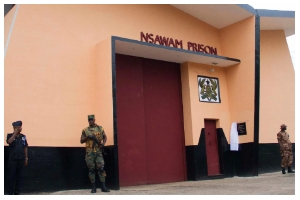By Nana Yaw Osei
My dear reader, this article is characterized with a long digression because it is more or less a commentary on James Karuga’s (a freelance Reuter journalist) article. If heaven was to be an academic subject, certainly that would have been history. History teaches valuable lessons of all kinds.
My good friend, Michael Adu (MPhil. Sociology) from the reputable University of Ghana (UG) and I had had many debates over the significance of history versus that of sociology. From my novice commonsensical thoughts, sociology unlike history is a confused subject (a prank apparently).
The French sociologist, Emile Durkheim (1858-1917) regarded as the founder or one of the founders of the academic discipline of sociology was objected by criminologist and social psychologist, Gabriel Tarde (1843-1904) that society cannot be defined.
In the view of Tarde, individuals within society can be defined but not society as a whole, therefore social psychology made more sense to him than a confused term sociology.
Apart from oral tradition as a source of history which does not make sense at times, history is very scientific because it reports past happenings of human as a territorial being. Oral tradition is never free from distortions. For example, the Eguafo people of central region of Ghana, claim that their ancestors descended from heaven in a big brass pan.
The Bono (Brong) people of Techiman assert that the autochthonous (indigenous) Bono emerged from a big hole in a place known as “Amowi”. This idea is shrouded in a song, sung and recited, during the annual “Apoo” festival of Techiman people in the modern Brong Ahafo region of the republic of Ghana.
History and antiquity have taught us important lessons such as the seven wonders of the ancient world. The seven wonders of the ancient world include: the great pyramid at Giza in Egypt, the hanging gardens of Babylon, the statue of Zeus at Olympus (Greece), the temple of Artemis of Ephesus, the Mausolenm at Halicarnassus, the Colossus of Rhodes and the lighthouse at Alexandria, Egypt. Civilization is the rise of culture into its height.
The seven wonders of ancient world elucidate major civilizations such as Egypt (c 4000BC) and Mesopotamia (c 3000BC). We are equally told of the dexterity of Axumites or Abyssinians (ancestors of modern Ethiopians) in constructing giant Obelist (Stelae) during 4th century AD.
The famous Senegalese historian, Cheikh Anta Diop opined that the makers of ancient Egyptian civilization were blacks. “From various Egyptian legends, I have been able to conclude that the population settled in the Nile Valley were Negroes, since the goddess Isis was said to have been a reddish-black woman.
In other words, as I have explained, her complexion is café’ au lait (coffee with milk), the same as that of certain other blacks whose skin seems to cast metallic reflections of copper” (Cheikh Anta Diop, African Origin of Civilization, 1974, page 76). If individuals from black racial stock could build pyramids of architectural majesty such as pyramid of Giza in Egypt and giant Obelisk of Axum in Ethiopia, then what happened to blacks relative to technological development? The answer is certainly cultural usurpation. History and antiquity have taught us that no society could develop with a dislocated culture.
Fellow countrymen, there is nothing that will make continent of Africa prosperous apart from our various God given cultures. Where is African cultural identity? African culture that will lead us to our final fictive goals had been jettisoned on unholy altars of Euro-centric convenience. Colonization led to total usurpation of African culture.
Colonization and slave trade is considered the most egregious holocaust bequeathed to Africans. In his book: “Christopher Columbus and the Afrikan Holocaust, Slavery and the Rise of European Capitalism” page, 93, Professor John Henrik Clarke, asserted that slavery and colonization remained the world’s greatest holocaust.
“It is our holocaust because this is a holocaust that started 500 years ago and it is not over. We do not start our count at 6 million, we start counting at 60 million, and we have just begun to count.” Professor Clarke, intimated. What is particularly lamentable is that, after the great holocausts in the world, Trans -Atlantic Slave Trade and colonization of Africa, the residual culture is equally being sunk into oblivion by some religious Jacobinists on the continent.
Many charismatic leaders who never went to accredited theological seminaries and also claimed to have received divine directions from God are leading African continent into a ditch. Like Rome in classics, everything in Africa now is divinely activated. For example, an institution of marriage that permeates in almost every culture in the world is now spiritual matters.
It is not uncommon to hear statements like: consider your boyfriend prayerfully, bring him to church, he is not prayerful don’t marry him, the lord ministered to me she is not the one, he is not spiritual and blablablabalabla! All the aforesaid statements are normally directed to the promising and pretty ladies or rich gentlemen in the church.
There is nothing wrong praying for a wife or a husband but it must not be a prerequisite for marriage. As Galileo Galilei asserted “the bible shows the way to go to heaven, not the way the heavens go.”
In Thailand, for example, the major religion is Buddhism and good marriages exist there. In Japan, Shintoism and Buddhism are the two major religions yet there are stable families or good marriages over there. Camping people’s daughters or sons in the churches for marriages have no scriptural basis but in the icy waters of the church leader’s egoistic calculation.
I think, the German philosopher, Friedrich Nietzscche was somewhat right when he intimated: “A casual stroll through the lunatic asylum shows that faith does not prove anything.” I think our good church leaders must concentrate on what Jesus told us: Therefore go and make disciples of all nations, baptizing them in the name of the Father and of the Son and of the Holy Spirit (Matthew 28:19).
They must stop discouraging people from marrying their soul partners because of their church attendance. They must also refrain from the so-called prophetic directions before marriage. Critical thinking in Africa today is sinking at an alarming rate! We need to revisit our history, traditions and concentrate on what God gave to our ancestors like the Masaai pastoralists of Kenya have done.
Fellow countrymen, critical thinking is dying in Africa. The Masaai pastoralists provide us with the benefit of critical thinking in Africa. The Masaai pastoralists of northern Kenya and some parts of Tanzania are the new hope of Africa. The journalist, James Karuga reported how Masaai pastoralist turn animal blood into biogas below.
”KISERIAN, Kenya (Thomson Reuters Foundation) - Maasai pastoralists have found an innovative way to generate biogas: using animal blood and waste from the Keekonyokie slaughterhouse.
The facility in Kenya’s Kajiado County uses the gas it produces to generate electricity that powers the meat cold room and processing equipment. It also pipes the gas to local hotels, while the slurry becomes fertiliser for grazing pastures.
Now the Maasai hope to take the project a step further and become the first group in the country to package the alternative fuel into cylinders – and finally make it mobile.
According to project leader Michael Kibue, the group of 320 pastoralists
anticipates that by March 2015 they will be selling their Keeko Biogas in 6 kilogram cylinders. Each should cost around Ksh 700 ($8), half the cost of conventional liquefied (LP) petroleum gas.
The slaughterhouse can afford to sell its biogas so cheaply because, with an average 120 cows and 400 sheep and goats slaughtered daily, "raw input is assured and at zero cost," said Kibue.
Even the process of pumping the gas into cylinders costs nothing, he adds, because it's powered by the slaughterhouse's own biogas.
The fuel is also hotter than LP gas “and it is highly combustible, so it allows you to cook faster”, said Erastus Gatebe of the Kenya Industrial Research and Development Institute (KIRDI), which provides technical support on the Keeko Biogas project. Gatebe said biogas can be as much as 30 to 40 percent more energy efficient than propane or butane.
Cutting cost
Before it started producing biogas in 2005, the Keekonyokie plant was spending Ksh 36,000 ($400) every week on waste disposal in order to meet standards set by the National Environmental Management Authority (NEMA).
By generating fuel from its waste and selling what biogas it doesn't need, the slaughterhouse can now expand its revenue sources beyond the sale of meat.
Currently the facility, which sits on 4 acres of land, is capable of generating enough biogas in a day to fill one hundred 6 kg cylinders. According to KIRDI's Gatebe, if the slaughterhouse upgrades its facilities with secondary biogas digesters it can generate three times that amount.
The Kenya Climate Innovation Centre, a World Bank initiative, is providing funding to help with the upgrade.
Kapunei Ole Tunda, chairman of Keekonyokie slaughterhouse, sees environmental as well as economic benefits to selling biogas in cylinders. He believes the venture could help save the trees in and around Maasai villages.
"We cut down a lot of trees for charcoal and we hope to reduce that, since they keep our air clean,” he said.
According to project leader Kibue, buyers have already begun making enquiries about the cylinders of Keeko Biogas. Two women's groups have expressed interest in the product, including one in Nairobi’s Kibera slum that makes yoghurt and wants to cut its energy expenses.
Cutting emissions
John Maina, the principal renewable energy officer at Kenya’s Ministry of Energy and Petroleum, said the government supports ventures such as Keeko Biogas that reduce the amount of methane escaping into the atmosphere.
Methane, the gas released when animal waste decays, is roughly 30 times more potent than carbon dioxide in producing climate change, according to the journal Nature.
India has already seen success in packaging biogas into cylinders. A recent report by India’s Ministry of New and Renewable energy says that 11 projects have so far been commissioned and licensed to package biogas into compressed natural gas (CNG) cylinders.
India's bottled biogas is supplied to hotels and companies for cooking and heating.
According to a 2010 report by the Kenya Institute for Public Policy Research and Analysis, biogas use in Kenya is currently very small. But the country spends around $900 million a year on off-grid lighting, and fuel-based light sources in the country are responsible for over 2.3 million tons of carbon dioxide emissions per year according to the United Nations Environment Programme.
The Maasai pastoralists who run Keekonyokie slaughterhouse see a big market for bottled biogas in Kenya. Once KIRDI finishes safety testing of the biogas cylinders, “we start rolling it out”, Kibue said” (Source: Reuters, January, 11, 2015). https://www.yahoo.com/news/turning-blood-power-maasai-pastoralists-begin-bottling-biogas-092258310.html?soc_src=mail&soc_trk=ma&ref=gs
Fellow countrymen, we can discover our true identity through history and culture. Ghanaian farmers and government must learn from Masaai pastoralist and think outside the box for other alternative sources of energy to ameliorate Ghana’s energy challenges. Ghana must make frantic effort to deconstruct our systems from its colonial frameworks.
The ingenuity of Masaai pastoralists must be commended. We must combine prayers with critical thinking. Underneath critical thinking lies the national development. God Bless Our Homeland Ghana. “I know that I am intelligent because I know that I know nothing.” (Socrates).
Writer's email: padigogoma77@yahoo.co.uk
Nana Yaw Osei (Padigo)
Opinions of Sunday, 30 October 2016
Columnist: Osei, Nana Yaw


















